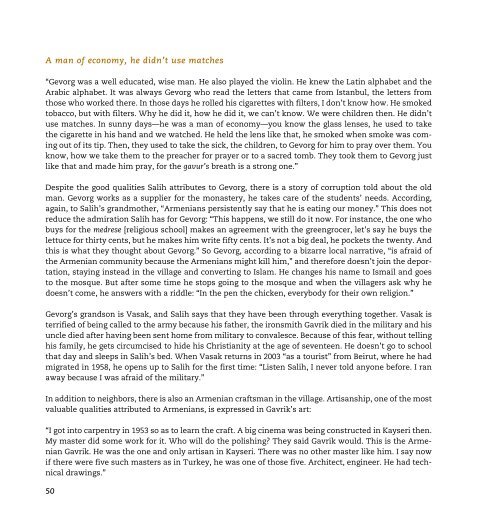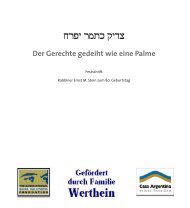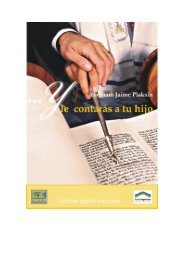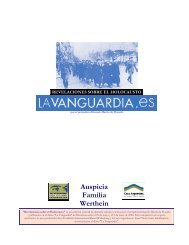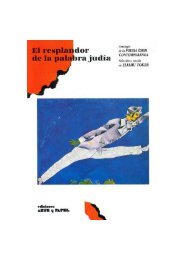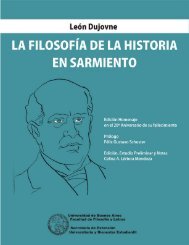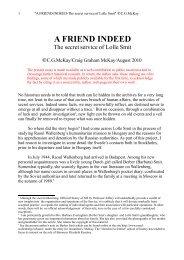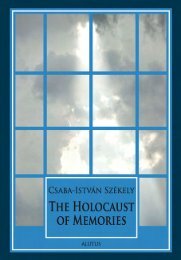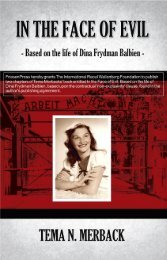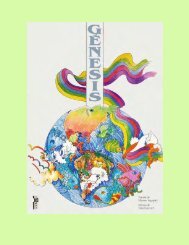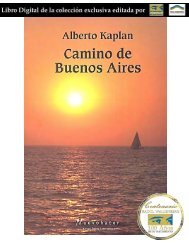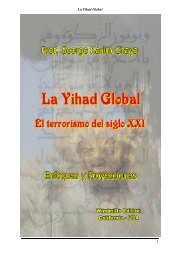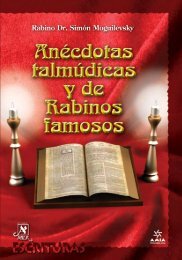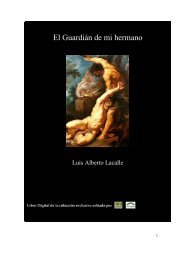A man of economy, he didn’t use matches“Gevorg was a well educated, wise man. He also played the violin. He knew the Latin alphabet and theArabic alphabet. It was always Gevorg who read the letters that came from Istanbul, the letters fromthose who worked there. In those days he rolled his cigarettes with filters, I don’t know how. He smoked<strong>to</strong>bacco, but with filters. Why he did it, how he did it, we can’t know. We were children then. He didn’tuse matches. In sunny days—he was a man of economy—you know the glass lenses, he used <strong>to</strong> takethe cigarette in his hand and we watched. He held the lens like that, he smoked when smoke was comingout of its tip. <strong>The</strong>n, they used <strong>to</strong> take the sick, the children, <strong>to</strong> Gevorg for him <strong>to</strong> pray over them. Youknow, how we take them <strong>to</strong> the preacher for prayer or <strong>to</strong> a sacred <strong>to</strong>mb. <strong>The</strong>y <strong>to</strong>ok them <strong>to</strong> Gevorg justlike that and made him pray, for the gavur’s breath is a strong one.”Despite the good qualities Salih attributes <strong>to</strong> Gevorg, there is a s<strong>to</strong>ry of corruption <strong>to</strong>ld about the oldman. Gevorg works as a supplier for the monastery, he takes care of the students’ needs. According,again, <strong>to</strong> Salih’s grandmother, “Armenians persistently say that he is eating our money.” This does notreduce the admiration Salih has for Gevorg: “This happens, we still do it now. For instance, the one whobuys for the medrese [religious school] makes an agreement with the greengrocer, let’s say he buys thelettuce for thirty cents, but he makes him write fifty cents. It’s not a big deal, he pockets the twenty. Andthis is what they thought about Gevorg.” So Gevorg, according <strong>to</strong> a bizarre local narrative, “is afraid ofthe Armenian community because the Armenians might kill him,” and therefore doesn’t join the deportation,staying instead in the village and converting <strong>to</strong> Islam. He changes his name <strong>to</strong> Ismail and goes<strong>to</strong> the mosque. But after some time he s<strong>to</strong>ps going <strong>to</strong> the mosque and when the villagers ask why hedoesn’t come, he answers with a riddle: “In the pen the chicken, everybody for their own religion.”Gevorg’s grandson is Vasak, and Salih says that they have been through everything <strong>to</strong>gether. Vasak isterrified of being called <strong>to</strong> the army because his father, the ironsmith Gavrik died in the military and hisuncle died after having been sent home from military <strong>to</strong> convalesce. Because of this fear, without tellinghis family, he gets circumcised <strong>to</strong> hide his Christianity at the age of seventeen. He doesn’t go <strong>to</strong> schoolthat day and sleeps in Salih’s bed. When Vasak returns in 2003 “as a <strong>to</strong>urist” from Beirut, where he hadmigrated in 1958, he opens up <strong>to</strong> Salih for the first time: “Listen Salih, I never <strong>to</strong>ld anyone before. I ranaway because I was afraid of the military.”In addition <strong>to</strong> neighbors, there is also an Armenian craftsman in the village. Artisanship, one of the mostvaluable qualities attributed <strong>to</strong> Armenians, is expressed in Gavrik’s art:“I got in<strong>to</strong> carpentry in 1953 so as <strong>to</strong> learn the craft. A big cinema was being constructed in Kayseri then.My master did some work for it. Who will do the polishing? <strong>The</strong>y said Gavrik would. This is the ArmenianGavrik. He was the one and only artisan in Kayseri. <strong>The</strong>re was no other master like him. I say nowif there were five such masters as in Turkey, he was one of those five. Architect, engineer. He had technicaldrawings.”50
<strong>The</strong> time Salih and Gavrik are working in the cinema coincides with the month of Ramadan. Gavrik“doesn’t even drink water” since his Muslim friends are fasting. Although they insist that he eat duringthe lunch break he doesn’t eat, but wraps the egged bread and takes it home like the others. Respect forlocal religious practice is one of the most distinct components of the memory of Armenians. Saying that“these were very decent people,” Salih expresses both the longing for the lost “unity” and the good qualitiesthat are associated with Armenianness.<strong>The</strong>re is a big difference between the past, remembered as a wedding ceremony with Armenians, Greeksand Turks and the present day. Those who are gone were crying as they left, they were afraid and “theywere such nice people.” Those who are left behind try <strong>to</strong> understand the reason for the difference betweenthe past and the present: “I asked why Tavlusun has been ruined—this village was a wonderfulvillage. ‘How did this village become like this?’ I asked, ‘Is it the gavurs’ curse, master?’ I asked Napolyon[whose nickname made reference <strong>to</strong> the fancy boots he wore]. ‘No, he said, ‘We were getting along verywell with the gavurs. <strong>The</strong> gavurs never complained about us. <strong>The</strong>re were no quarrels, no conflicts. Nordid we confiscate their property.’”But Napolyon answers Salih’s question with the s<strong>to</strong>ry of Basri Efendi who “jumps on the Greek girl,” andof his son whom he never acknowledged, but who still writes letters from Greece:“Now Napolyon says, during the War of Independence, the government gave the soldiers’ families wheatfor bread, with the papers that the village headman provided. <strong>The</strong> women went <strong>to</strong> the building wherethe government distributed wheat. Women brought their sacks and waited in line. On the day they gaveout wheat, he says, they got the wheat for free. <strong>One</strong> of them is a court clerk and the other is a recordingofficer. <strong>The</strong>y are brothers-in-law. He says, ‘<strong>The</strong>y choose two women from there. Just two of them.’ ‘Youlook like a nice lady, <strong>to</strong>day rye will be distributed, I am in charge here, <strong>to</strong>morrow wheat will be distributed.Now go without saying anything <strong>to</strong> anybody and come back <strong>to</strong>morrow at nine.’ ‘Indeed there is nothing<strong>to</strong>morrow,’ he says. ‘What could the woman do, man,’ he says, ‘her children are at home, hungry.Hungry!’ She believes him and comes the next day. Salih Baba has a horse carriage, covered you know.‘<strong>The</strong> carriage comes in the morning’, he says, ‘and takes the women: “We’re going <strong>to</strong> the warehouse <strong>to</strong>give you the wheat.” <strong>The</strong>y have their own men with them. <strong>The</strong>y bring them here,’ he says, ‘<strong>to</strong> the garden,you know, <strong>to</strong> the house in that garden. And they come in the afternoon, they drink raki, they booze,they play, they dance and the women are raped.’”Napolyon puts a picture of the damned next <strong>to</strong> the wedding picture in the album of the past: “<strong>The</strong>y destroyedTavlusun, my boy. If Tavlusun is cursed, it’s because of them. ‘And it is our bastards who did it,’said Napolyon. <strong>The</strong> man who lived through this said it, not me. He said, ‘I didn’t hear this from someone.I’m the one who has seen this.’”51
- Page 2 and 3: Published by:Institut für Internat
- Page 5 and 6: ContentsForeword...................
- Page 7 and 8: ForewordThe project “Adult Educat
- Page 10 and 11: Aras, Yasin Aras, Welat Ay, Cenk Ce
- Page 12 and 13: The main audience of this book is o
- Page 15 and 16: “Wish they hadn’t left”:The B
- Page 17 and 18: ed by 1915 and where memories of Ar
- Page 19 and 20: 1915 tends to be represented by int
- Page 21 and 22: Yet to a large extent, Turkish inte
- Page 23 and 24: this, we can’t. It’s impossible
- Page 25 and 26: een very advanced in trade and craf
- Page 27 and 28: How to Come to Terms with Phantom P
- Page 29 and 30: It is always you who has to be nice
- Page 32 and 33: to the way he was raised: “They f
- Page 34 and 35: empathize with Armenians: “My aun
- Page 36 and 37: Adil is not the only one marked by
- Page 38 and 39: ness may be an attempt to overcome
- Page 40 and 41: dernity and the oral transmission o
- Page 42 and 43: A soup pot with spoons around itAt
- Page 44 and 45: What if My Mother is Armenian?Ruhi
- Page 46 and 47: If I were younger I’d get baptize
- Page 48: with butter. We’ll serve the impo
- Page 53 and 54: Turkey’s changing context is refr
- Page 55 and 56: ‘It was to be expected.’ And my
- Page 57 and 58: against one another. The feet of th
- Page 59 and 60: Fear of Losing a CityZübeyde was b
- Page 61 and 62: half for me.’ But what do our Mus
- Page 63 and 64: e discussed when the kids were arou
- Page 65 and 66: possible by the difference in relig
- Page 67 and 68: The Charm of AraratMehmet is a 62-y
- Page 69 and 70: dogs protected the sheep against wo
- Page 71 and 72: The Story of the “Night People”
- Page 73 and 74: “I don’t know why, but my grand
- Page 75: Research in Armenia:“Whom to Forg
- Page 78 and 79: and can generally be located in Tur
- Page 80 and 81: “Whom to Forgive? What to Forgive
- Page 82 and 83: “Private Stories”After the esta
- Page 84 and 85: Recalling MemoriesOral history diff
- Page 86 and 87: In the village of Ujan, where the v
- Page 88 and 89: The home-museum of Gevork Chaush in
- Page 90 and 91: Memorial in the Ashnak village dedi
- Page 92 and 93: other regions are entirely populate
- Page 94 and 95: sources and materials for their mem
- Page 96 and 97: Ergir’s Soil is Strong, Ergir’s
- Page 98: Tatevik, the granddaughterof Mihran
- Page 101 and 102:
eral meanings in Armenian -”whole
- Page 103 and 104:
The Gospel with Golden Binding of S
- Page 105 and 106:
keeps a copper chalice that was bro
- Page 107 and 108:
In some families the passports of t
- Page 109 and 110:
at that time, Mustafa and Jamal, wh
- Page 111 and 112:
People were so frightened to lose g
- Page 113 and 114:
naked, they were decapitating every
- Page 115 and 116:
Water, Fire, Desert“There was an
- Page 117 and 118:
his mother dragged him behind her,
- Page 119 and 120:
Many of our narrators mention the R
- Page 121 and 122:
In the word-stock of the survivors
- Page 123 and 124:
in Kurdish villages, and helping th
- Page 125 and 126:
“Well, They Are Human Too”Even
- Page 127 and 128:
member this well, they said, the el
- Page 129 and 130:
speak to each other. Questioned by
- Page 131 and 132:
Hamze Ptshuk, survived from Hosnut
- Page 133 and 134:
“I don’t Know...”Why did this
- Page 135 and 136:
“My Dear Almast, Write it Down, W
- Page 137 and 138:
took his rifle and ran. The dog fel
- Page 139 and 140:
she didn’t tell it to me. In the
- Page 141 and 142:
elder guy in this house died and hi
- Page 143 and 144:
AH - Turks always killed to get int
- Page 145 and 146:
“My Father used to Tell us at Hom
- Page 147 and 148:
person... I have never seen him, bu
- Page 149 and 150:
gotten what you knew”. So, out of
- Page 151 and 152:
a paid Adult Residential Facility,
- Page 153 and 154:
It was probably after 60s... My fat
- Page 155 and 156:
the Vardevar 1 day . Even if we mak
- Page 157 and 158:
that this wasn’t a dream... and..
- Page 159 and 160:
was our historical village. Nich, I
- Page 161 and 162:
just filming around myself with no
- Page 163 and 164:
that person whether I could take a
- Page 165:
[Turk. wife]”. In the morning I t
- Page 168 and 169:
4 Albert Mamikonyan,1953, in Kirova
- Page 170 and 171:
11 Almast Harutyunyan,1920, Ujan vi
- Page 172 and 173:
18 Eleonora Ghazaryan.1949, Ashnak
- Page 174 and 175:
26 Nairi Tajiryan,1936, Egypt (Cair
- Page 176:
33 Vazgen Ghukasyan,1933, Ashnak vi


